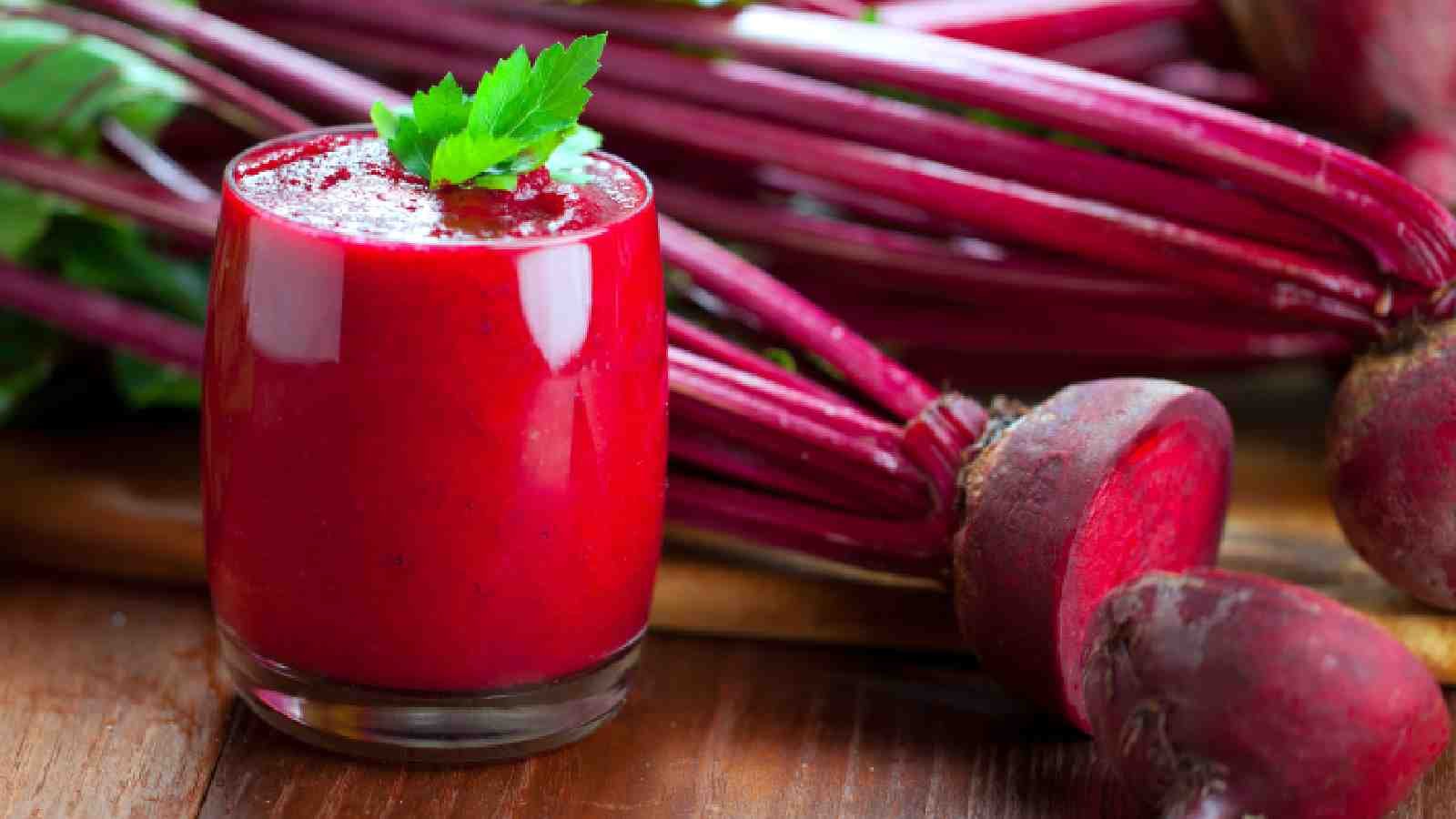Find the health benefits of beetroot juice, potential side effects, and safe consumption tips to maximise health without risks.
Beetroot juice has gained popularity as a health drink, often touted for its numerous benefits. Many people enjoy it as a pre-workout beverage or add it to their breakfast spread for an energizing boost. This vibrant red juice is derived from the root of the beet plant and is rich in nutrients, including betalains, nitrates, and vitamin C. However, while it certainly offers health benefits, you must be aware of the potential side effects of too much beetroot juice
Health benefits of drinking beetroot juice
Before diving into the potential downsides of drinking beetroot juice, let’s first understand what makes this drink popular among health aficionados:
- Cardiovascular health: Beetroot juice is rich in nitrates, which help widen blood vessels. This effect can reduce strain on the heart and improve overall cardiovascular health. A 2015 study in Experimental Biology and Medicine demonstrated that beet juice can enhance cardiac function.
- Enhanced exercise performance: Many athletes consume beetroot juice before workouts, as it may boost performance by improving blood flow to the muscles and reducing soreness, making workouts more effective.
- Cognitive function: “The nitrates in beet juice may also promote better blood flow to the brain, potentially enhancing cognitive function, focus, and memory,” says Dr Archana Batra, a nutritionist and certified diabetes educator.
- Immune support: Rich in vitamin C, beetroot juice can help bolster the immune system, playing a vital role in preventing illnesses.
- Liver health: Research published in Frontiers In Nutrition in 2023 suggests that beetroot juice can support liver detoxification by eliminating toxins, making it a potential ally against non-alcoholic fatty liver disease.
While these benefits are noteworthy, it is vital to understand the possible side effects associated with excessive consumption.

Does beetroot juice have side effects?
With any health trend, moderation is important. Here’s what you need to know about the potential adverse effects of drinking too much beetroot juice:
- Cancer risk: Beets are high in nitrates, which, when consumed in excess, can react with stomach acids and form N-nitroso compounds, potentially increasing cancer risk, according to analysis published in Critical Reviews in Food Science and Nutrition
- Kidney stones: Beetroot juice contains oxalates, which can bind with calcium in the body and form calcium-oxalate crystals. This process can increase the risk of kidney stone formation, especially for those already prone to these issues.
- Blood pressure issues: While beetroot juice may help lower blood pressure, it can be problematic for individuals who already have low blood pressure or are taking medication. A sudden drop can lead to dizziness or fainting.
- Digestive discomfort: “The high acidity of beet juice may cause digestive disturbances, particularly for those consuming it in large quantities or on an empty stomach. Symptoms may include bloating, gas, or diarrhoea,” says Dr Batra.
- Hair loss: High levels of oxalates can interfere with the body’s absorption of important minerals like zinc, a critical nutrient for hair growth. In the long run, this nutritional interference could lead to hair thinning or loss.
- Blood sugar spikes: Beetroot contains a moderate amount of natural sugar. While whole beets contain fibre to help regulate blood sugar, beet juice lacks this fibre, making it easier for blood sugar levels to spike—this is particularly concerning for people with diabetes.
- Medication interactions: Beetroot juice may interact with certain medications, especially anticoagulants, because it contains vitamin K, which is involved in blood clotting. This interference could reduce the effectiveness of these medications.
How much beetroot juice is safe to drink daily?
To mitigate the potential side effects associated with beetroot juice, it is recommended to limit your intake to 120-240 ml (approximately half to one cup) per day. This amount is believed to be effective in promoting heart health, enhancing stamina, and providing other benefits without overwhelming the system, according to Dr Batra.
Experts often recommend that consuming the whole beetroot is more beneficial than juicing it. Whole beets retain their fibre, which helps regulate blood sugar and supports digestive health. For individuals managing diabetes, consuming whole beets—rather than drinking the juice—is advisable, as the fibre helps slow down sugar absorption, thereby preventing spikes in blood sugar levels.
Is it safe to drink beetroot juice daily?
If you’re a fan of beetroot juice, here are some tips to enjoy it every day safely:
- Moderation is key: Be mindful of portion sizes and stick to recommended daily limits.
- Listen to your body: Pay attention to how your body reacts to beet juice. If you experience any adverse symptoms, consider reducing your intake or discontinuing altogether.
- Combine with other foods: When consuming beetroot juice, try pairing it with proteins or healthy fats to help stabilise blood sugar levels.
- Consult with your doctor: If you have any existing health conditions or are taking medication, it’s wise to speak with your healthcare provider before introducing beetroot juice into your diet.
Disclaimer: At Health Shots, we are committed to providing accurate, reliable, and authentic information to support your health and well-being. However, the content on this website is intended solely for informational purposes and should not be considered a substitute for professional medical advice, diagnosis, or treatment. Always consult a qualified healthcare provider for personalised advice regarding your specific medical condition or concerns.








